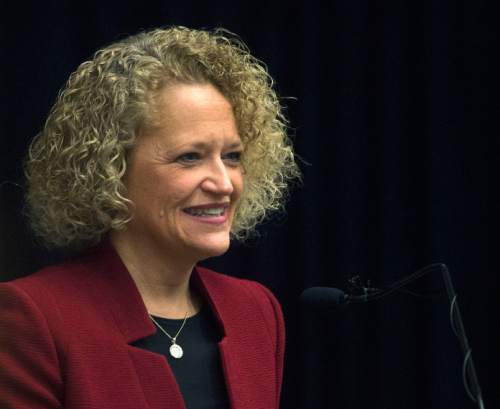This is an archived article that was published on sltrib.com in 2016, and information in the article may be outdated. It is provided only for personal research purposes and may not be reprinted.
It really doesn't matter who dropped the ball. Though it's pretty clear that someone did.
It falls now to Salt Lake City Mayor Jackie Biskupski to pick up the city's fumbled attempt to restructure the impact fees it charges for new construction and start getting the money to places where it is very much needed.
Along about Halloween last, the City Council took the advice of then-Mayor Ralph Becker and imposed a one-year moratorium on the collection of impact fees. Salt Lake City, like many other municipalities, expects certain fees from developers to help pay for the streets, parking lots, parks, public safety infrastructure and other basics of modern life that will be stressed by the residents of new apartment complexes or the commuters drawn by new business developments.
Biskupski, then a candidate challenging Becker's re-election, opposed the moratorium, as did we. There were reasonable points raised about the city's fee structure being, perhaps, too high or otherwise out of whack with best practices. There were uncertainties and perhaps unfair limits on how the money could be spent.
But the moratorium was too drastic a step. It was basically an undeserved bingo for developers who happened to have a project ready to go. It allowed the quick or the lucky to pocket many, in some cases more than a million, dollars that would otherwise have gone into the city's stressed coffers for such things as new or rebuilt streets, fire stations and other things that cities need more of as they grow.
The moratorium is set to end Nov. 1 and, we learned just the other day, neither the new mayor nor the partly new council is anywhere near ready with a new fee structure.
Biskupski was apparently waiting for the council to make its preferences known. But the council, apparently, was waiting for the mayor's office — carrying the consultant's study that, everyone thought, Becker had arranged for — to come to them with a proposal.
This is one of those things that could be lost in the transition from one administration to another. It is also something that falls to the executive branch to study, develop and propose and to the legislative branch to react, amend and adopt.
It's a complex issue. Wrinkles include honest disagreements over the responsibility of development to pay its way and some perhaps overly prescriptive state laws that make it difficult for cities to make maximum use of fees they collect.
But precious time, and needed dollars, are getting away. Extending the moratorium would just cost the city, and all who depend on its services, more needed revenue.
This mess needs to be cleans up. And it is the mayor, whether it was her fault or not, who needs to be leading the way.



